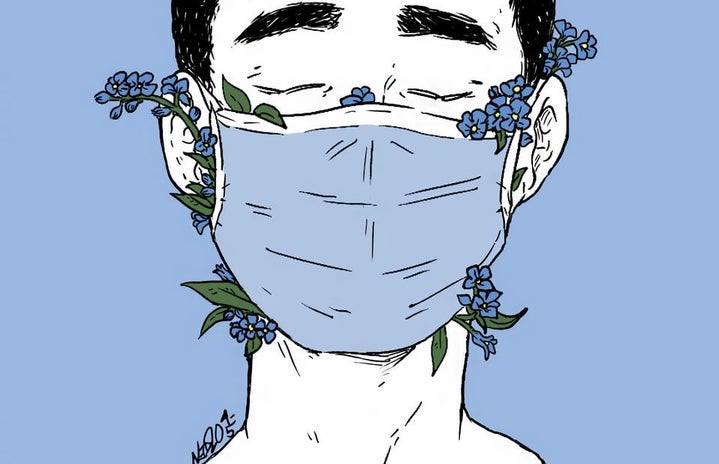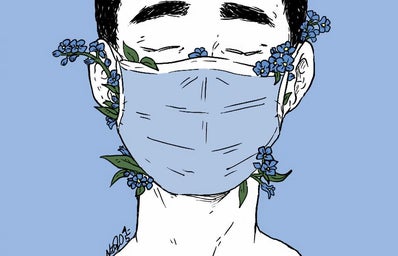Students at the University of North Texas have seen their mental health being negatively inflicted by the ongoing pandemic, with many turning to substance abuse to cope. Many students are remotely learning from home to avoid in-person classes that separate them from their campus community.
“In the initial time of COVID, even though there was a challenge with access to schools, the students strode better with the thought process that the situation would improve,” Director of the MS Clinic at Texas Institue for Neurological Disorders Bharathy Sundaram said. “As time went by, there was a slow escalation of confusion and anxiety, which was causing concern about the forthcoming classes in them.”
Many students chose to stay off-campus, with a handful on-campus as well. Each type of student encounters different problems depending on the environment they are in.
“I am staying on-campus, and even though it puts me more at risk, I feel less alone,” UNT junior Danielle Zachariah said. “Having strict parents at home made me feel more stressed, and getting to live on campus with peers brings a source of comfort despite classes.”
The majority of students have been home during the lockdown and may find it easier to live on-campus because of how prolonged this period has been. It is hard for them to feel motivated for classes in a home environment, depending on how their families handle that their bedroom is their classroom.
Teenagers and young adults tend to experiment with substances, and these trying times have made many seek out coping mechanisms.
“I smoke a few blunts each day, and started vaping as the pandemic got worse,” UNT junior Kelsey Kim said. “I had stopped for a while, but the situation had me involuntarily reaching for a smoke any chance I could get, even during Zoom classes. I spend so much money on it too, and all to have some way to have fun while quarantining.”
Kim moved out of her apartment because of her extensive substance use becoming known to her parents.
“I did not see any incremental increase in the substance abuse due to the COVID pandemic,” Homoeopathic Doctor at Prana For You Lakshmi Subramanian said. “In fact, due to the quarantine, there was less access to acquire drugs from the street.”
However, according to the CDC, U.S. adults reported an increase in mental health conditions concerning COVID-19. Younger adults were part of the majority that reported negative mental health outcomes, surging use of substances, and heightened suicidal thoughts.
“There has been a consensus to help one another, with people being more cordial and tolerant while adapting to the pandemic for survival despite the frustration,” Subramanian said. “Schools should focus on reopening, which itself would help students get back on track.”
The pressure on professors to formulate fully-online classes and assignments has increased the workload on both them and students.
“As a journalism major, I do not get to go out and do interviews for assignments,” Danielle Zachariah said. “It is hard to do the number of stories we have to do when many sources are not responding and getting the full grasp of a story from our phones.”
It is easy to ignore the mental health decline when it is not personal, but many students have reported adverse effects and falling into drug or alcohol abuse to deal with the stresses of isolated learning. People on campus are less closed off but many are also disregarding safe social distancing.
“I think we have gotten so used to the pandemic, we are acting out,” Zachariah said. “My roommate threw a party our first week back, and she has been going to frat parties on campus…I don’t get how they don’t realize alcohol abuse is a thing too.”
Efforts throughout the community are rising as awareness is being created, and priority should be given to unpaid caregivers, essential workers, minorities, and young adults, who have reported the most mental health deterioration. Intervention and public health prioritization will help combat the rise of mental health conditions during the pandemic.
“It also should be noted that there have been lots of support systems created through accommodations, counseling, and improvising more tolerance to the testing system,” Director Bharathy Sundaram M.D. said. “I encourage yoga and other holistic ways along with medical help as it can help overcome respective issues with mental instability, stress, and mood.”
Documentary Source:
“Mental Health, Substance Use, and Suicidal Ideation During the COVID-19 Pandemic – the United States, June 24–30, 2020.” Centers for Disease Control and Prevention, Centers for Disease Control and Prevention, 13 Aug. 2020, www.cdc.gov/mmwr/volumes/69/wr/mm6932a1.htm (Links to an external site.).
Sources:
Danielle Zachariah
Kelsey Kim
Homeopathic Doctor, Lakshmi Subramanian
Bharathy Sundaram, M.D. – Multiple Sclerosis Specialist, Director of MS Clinic at Texas Institute for Neurological Disorders, Certified by the American Board of Psychiatry and Neurology (


